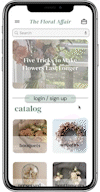
CASE STUDY SLIDESHOW
OVERVIEW
BACKGROUND
The Floral Affair is an up and coming floral shop in Oregon that offers scheduled in-store pick up service – a service that no flower shop within the state has. They not only ensure the quality and freshness of the flowers, but also offer competitive pricing. The Floral Affair hopes to attract and retain customers who wants to get beautiful flower arrangements at any time they want.
GOAL
Allow The Floral Affair’s customers to schedule an order to be picked up at a desired time.
PROBLEM
Busy customers don’t have time to browse for flowers directly in the shop, and want to acquire flowers at a certain time to ensure freshness.
DURATION
January 2022
MY ROLE
UX Designer - from conception to creating a schedule for pick-up
MY RESPONSIBILITIES
Conducting interviews, paper and digital wireframing, low and high-fidelity prototyping, conducting usability studies, accounting for accessibility, and iterating on designs.
USER PAIN POINTS
TIME
Busy young adults & adults who can’t be bothered visiting a flower shop and pick every flowers one by one.
ACCESSIBILITY
Platforms for buying flowers are limited and most of them aren’t equipped with assistive technologies & language options
IA
Text-heavy menus in apps are often difficult for the eyes.
I conducted interviews and created empathy maps to understand the users I’m designing for and their needs. A primary user group identified through research was busy young adults and adults who want flowers at a specific time.
This user group confirmed initial assumptions about The Floral Affair’s customers, but research also revealed that time was not the only factor limiting users from buying flowers. Other user problems included lack of flower knowledge, limited budget, interests, or challenges that make it frustrating to get a desired flower arrangement.
PERSONA:
NOELLE PARK
Problem Statement: Noelle is a busy student with a part-time job who needs flexible scheduling option to buy fresh flowers for a shrine at home.


USER JOURNEY: NOELLE PARK
Mapping Noelle’s user journey revealed how helpful it would be for users to have access to a dedicated The Floral Affair’s app.
COMPETITIVE AUDIT
An audit of a few competitor’s products provided direction on gaps and opportunities to address with the app.

IDEATION
.Taking the time to draft iterations of each screen of the app on paper ensured that the elements that made it to digital wireframes would be well-suited to address user pain points. For the catalog I chose to add more space for brief description of each product for efficiency.


INITIAL UI DESIGN AND WIREFRAME
I conducted two rounds of usability studies. Findings from the first study helped guide the designs from wireframes to mockups. The second study used a high-fidelity prototype and revealed what aspects of the mockups needed refining.
The first usability study revealed that users wouldn’t think to login/sign up at first glance, they wanted to keep browsing after adding to cart, and they thought the scheduling system could be more compact.
The second usability study revealed that users thought the checkout process was pretty confusing and that there were too many buttons.
HI-FI PROTOTYPE
The final high-fidelity prototype presented cleaner user flows for checking out and scheduling an order. It also met users preferences to keep browsing after adding a product to cart.

ACCESSIBILITY CONSIDERATIONS
1
Provided access to users who are vision impaired through adding alt text to images for screen readers.
2
Easier-to-navigate buttons and icons for universal understanding.
3
Option to switch languages for user whose first language isn’t English.
TAKEAWAYS: IMPACT
The app makes users feel like The Floral Affair really thinks about how to cater to their needs and preferences.
One quote from peer feedback: “As someone who has vision impairment, this app is so pleasing to the eyes and mind! I would definitely regularly buy & schedule flowers from this app.”
TAKEAWAYS: WHAT I LEARNED
While designing the The Floral Affair’s app, I learned that initial ideas for the app are only the beginning of a process. Usability studies and peer feedback influenced each iteration of the app’s designs.

NEXT STEPS
1. Conduct another round of usability studies to validate whether the pain points users experienced have been effectively addressed.
2. Conduct more user research to determine any new areas of need.
3. Consider making this app available on other devices as well and applying responsive design to fit each device and screen size.
